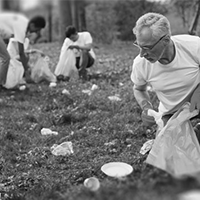 Contact
About Us
Articles
Home
Contact
About Us
Articles
Home

When something as devastating as the coronavirus COVID-19 pandemic comes along, there seems to be a tendency to look for "silver linings" within the tragedy of illness, death, smaller paychecks and diminishing retirement savings. For some, the imposed isolation provides guilt-free time to pursue a hobby or to dig into a reading list that has grown substantially over the years.
Others are using the free time to catch up on sleep or on those small projects they have been ignoring because they didn't have the time. Many are falling into new routines: get up late, eat breakfast, take the dog for a walk, putter around the flower beds, have some lunch, more puttering, another walk, watch Dr. Phil, eat dinner, watch a sit-com or two, one last walk for Fido, and back into bed to continue the cycle.
Thanks to shelter-in-place orders, workers who are approaching the traditional age of retirement are getting a taste of what it's like to no longer be tied to a job. During those first exhilarating weeks, every day is like a Saturday as they drink in their newly found freedom. Yes, their movements are restricted for now, but imagine how great it will be when retirement includes the freedom to travel and hit the golf course!
Unfortunately, the joy of this COVID-induced holiday does not continue to feel liberating for everyone. Just like those snow days, which kept us homebound from work or school, many are yearning to get back to a "normal life" in which their activities have meaning, and they can enjoy real-life social interactions with coworkers and friends.
No matter how well you think you have planned things, your first day of retirement can feel about as abrupt as the forced isolation from the coronavirus: On Friday, you were employed, and on Monday, you weren't. Many of the relationships that were an integral part of your everyday life — coworkers, friends and clients — are suddenly severed.
But shelter-in-place restrictions are distinguished from retirement in one respect: The virus is forcing you to take several weeks away from work with reduced income while a retirement quarantine could last 20 to 30 years. Retirement for many also turns into social isolation that intensifies as the years pass and social circles continue to shrink. For many retirement newbies, those long-awaited "golden years" prove to be gilded in a relatively short time.
Most of us have been sufficiently warned about saving too little for retirement, but few, if any, have prepared us for all the free time we will face. You might have made up a to-do list shortly after social distancing began, but you've probably worked your way through it by now. You'll need more than a page full of tasks — or even a bucket list — to provide you with something to sustain you for decades.
Now that the pandemic has provided you with the opportunity to sit quietly and ruminate, ask yourself a few questions:
Think very hard about this last question because you might be waking up on 10,000 mornings during retirement. Use this trial run to identify activities that will have you hopping out of bed (figuratively, of course) on every one of those mornings. Will you work part-time (maybe even full-time), play golf, travel, learn a new language, volunteer or become a care provider?
A recent article in the New York Times focused on the phenomenon called "unretirement," in which a person who has already retired makes a 180-degree turn and returns to the workforce. The article points to a study that shows 40% of workers over the age of 65 had previously been retired, and further research found that the decision to resume working did not usually stem from unexpected financial problems or health expenses.
"You hear certain themes: A sense of purpose. Using your brain," reported an economist associated with the study. "And another key component is social engagement." Earning money, while welcomed, rarely proved to be the primary incentive.
Take the case of Michelle Wallace, a Colorado telecommunications manager, who discovered the importance of purpose after a year-and-a-half of retirement. She had retired in 2013 when her workplace, as she put it, "turned chaotic and hostile."
Even though Ms. Wallace had saved enough to feel economically secure, without a job, she "felt like (she) was free-floating, bobbing along on the ocean ... very ungrounded." Her friends began to notice that she was becoming more reclusive, and her doctor increased her anti-depressants.
Finally, she found a part-time job with a small business that supports government researchers. Now 69, she has no interest in retiring again. "As long as somebody wants me," she said, "I have a lot to contribute."
Many of the retirement stories you'll read or hear about will come from disillusioned retirees who bought into those images of golf courses, beaches, boats and foreign lands. Most of us don't get the opportunity to see retirement for what it is until we arrive there. And for some of us, the abrupt shift in our lives can bewilder us and leave us feeling "very ungrounded."
Often, at this new stage in our lives, we realize that although we have been planning for this eagerly awaited event, we were not prepared for it. If something beneficial is to come as a result of COVID-19, maybe it can be to alert those who are within reach of retirement that planning is an excellent idea, but preparation is infinitely better.
Alliance America is an insurance and financial services company. Our financial professionals can assist you in maximizing your retirement resources and achieving your future goals. We have access to an array of products and services, all focused on helping you enjoy the retirement lifestyle you want and deserve. You can request a no-cost, no-obligation consultation by calling (833) 219-6884 today.


